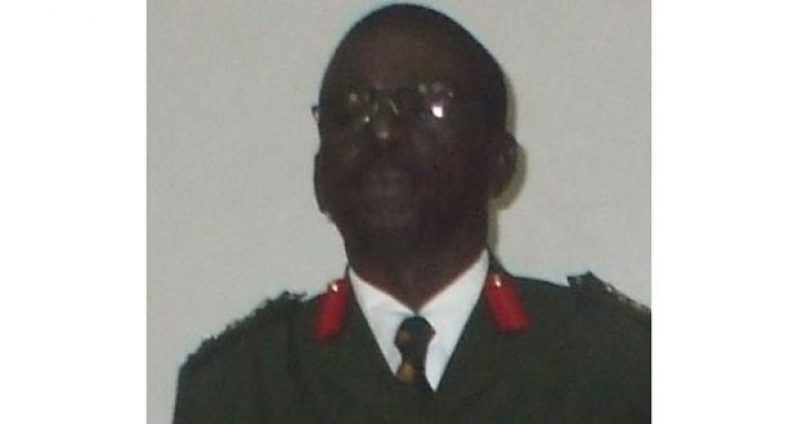THE Guyana Defence Force is ramping up its fight against narco-trafficking here; and new Chief-of-staff, Brigadier George Lewis, has promised a more robust regime of vetting for prospective members of the military.The GDF had in the past attracted unsavoury characters; only late last year, 27-year-old Lance Corporal Aaron Eastman was charged, along with three others, for possession of arms and ammunition.
Eastman and the three other men were, in December 2015, nabbed in a car on Regent Street with a sawn-off shotgun and a revolver with matching ammunition. At time of the arrest, the soldier was illegally absent from work, having abandoned his post; and was driving around with suspicious characters. He was caught wearing an overcoat over his uniform, and was driving the car with a shotgun under the seat. The other weapon was found under the other front passenger seat.
Eastman was enlisted in the GPF on April 10, 2006.
The police had linked at least one of the suspects in that car to a robbery at AH&L Kissoon.
In an interview with the Guyana Chronicle on Saturday, Brigadier Lewis noted that the army enlistment systems cater for the vetting of persons prior to their being recruited, and also while they are on the job. He noted that vetting involves a process wherein background checks are undertaken, and he said senior officers are not exempted from the vetting process.
”Even if you are commissioned, even if you are successful in the recruitment course, you are vetted,” Brigadier Lewis said.
He said an arms storesman receives “even more detailed vetting”, and this is relative to the nature of the job.” For a soldier to be posted to any other sensitive area, additional vetting of the individual must be done to ensure “we select the right persons going to those positions; persons whom (we) can trust”.
The Chief-of-Staff noted that the army had, in the past, parted company with a number of recruits who were undergoing training because their vetting had proved them undesirable, and he added that vetting is carried out before the recruitment process is completed.
If it is discovered that persons who had committed civil offences — which can range from murder to petty theft –- have attempted to join the GDF to gain shelter, the army would, in some cases, terminate their recruitment. “We have, in the past, picked up some unsavoury characters, persons whose past was a little shady; and once we detect that, we would part company”, the Chief of Staff said.
SHAKE-UP
Following his ascension to the Chief of Staff post, Lewis said, several appointments were made in the various units within the military. Colonel Patrick West was appointed Deputy Chief of Staff, and Inspector General Colonel Gary Beaton was moved from being head of the Coast Guard and was appointed Adjutant General. Colonel Nazrul Hussain was assigned to being Commandant of Guyana People’s Militia; Colonel Paul Arthur was appointed Quartermaster General, and Commander Orin Porter assumed responsibility for the Coast Guard.
“Indeed we have a very strong officer corps, and they are the senior to middle level managers,” Brigadier Lewis told the Guyana Chronicle.
Speaking about the training of officers, Lewis said that on entering the GDF, the individual undergoes initial training, a standard one-year for new officers; and after completion of that course, the individual would complete a number of other courses, gets promoted and, if qualified, undergoes other tests at the next levels.
The GDF also administers “a strong” Warrant Officer Corps, Brigadier Lewis said, and the ranks here would provide hands-on leadership to the junior ranks. In this aspect of the Force, the Warrant Officer is required to undertake a number of courses in management and leadership programmes, in order to be qualified for further ascension.
“It makes them better prepared, and equips them to better perform their duties”, the Chief of Staff said.
He explained that the army administers training to the officers from the time they enter the GDF until retirement, and ranks are exposed to training overseas through bilateral training agreements with other countries, including the United States of America, China and Brazil. Some ranks train in Jamaica among other regional jurisdictions.
But what happens in the case of the other ranks — those soldiers who enter the army from the level of private after enlistment, and who may not be as skilled as the officers on entering the GDF?
THE OTHER RANKS
In this regard, Brigadier Lewis said, after a new soldier has graduated from the Colonel Ulric Pilgrim Officer Cadet School, he/she is assigned to a unit and “is immediately put in training in the unit to make him/her functional.”
As an example, he said that if the rank is assigned to the Signal Department, the rank would undertake a grade three Signal Course in order to effectively operate and communicate in that unit. “If he goes to the Special Forces, he would do a grade three Paratroop Course; if it’s Infantry, he would do a standard Infantryman’s course”, he explained.
“So, at that entrance level, just immediately after entering the GDF and graduating from the basic recruitment course, when (recruit) graduate, they go to the unit and they are involved in training specific to their roles”, Brigadier Lewis said.
He added that the ranks are required to undertake a Junior Leaders Course, and would undertake training at the level of Lance Corporal and Senior Private. He said that course is done after the rank would have served two years, and it is done in order to prepare the rank for commanding at the junior level. He said the training involves core skills, shooting and running, “but it involves a certain amount of leadership”.
After 4 to 6 years of service, the rank would return to undertake a Section Commander’s Course; or if the rank belongs to a specialist unit, the grade two Signal Course, which equips the ranks with knowledge and management skills to command at the next level.
“At that time the person would be a corporal”, the Chief of Staff said.
Some 7 or 8 years later, the ranks are exposed to the Platoon Sergeant’s Course, or another course at that level. ” The platoon trains them to command at the platoon level”, he said.




.png)










1 thought on “Robust vetting of GDF recruits …several with criminal links turned away”
A good move by the G.D.F. Some criminals enlist for the training and then uses that skill for criminal activities.